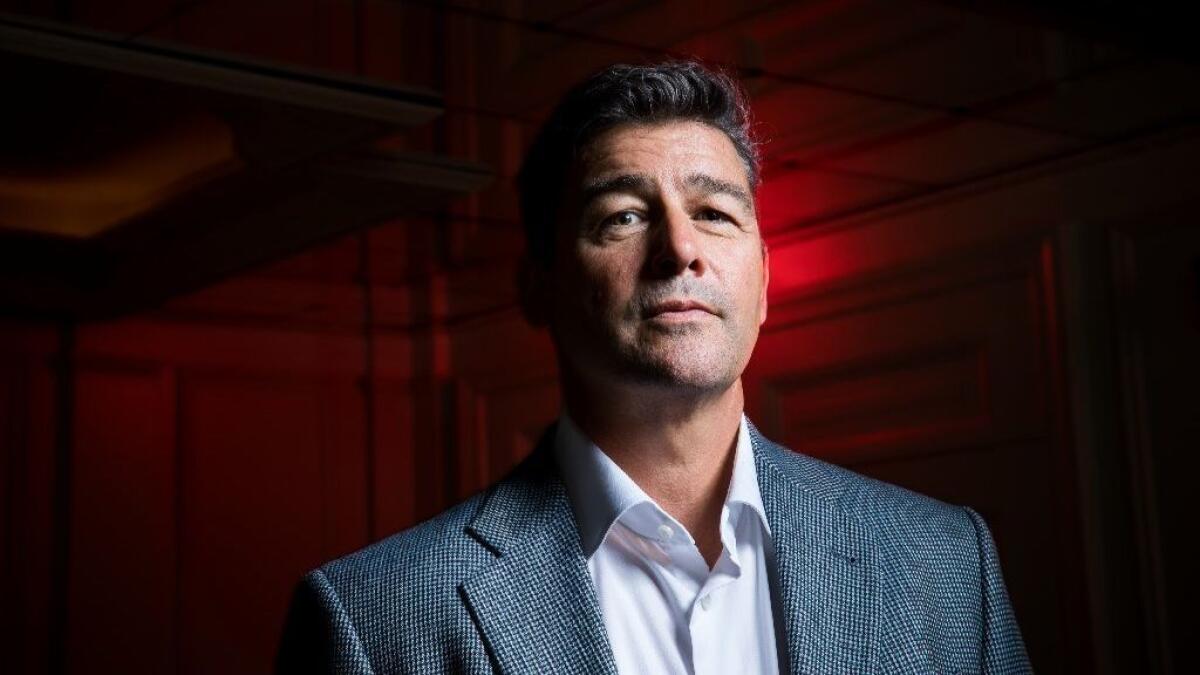Q&A: For Kyle Chandler and ‘Catch-22,’ it’s about finding humanity in the absurdity

Reporting from New York — Know why executive producer George Clooney wanted Kyle Chandler to play the obsessive Col. Cathcart in Hulu’s remake of “Catch-22”? Simple: “Kyle is Jimmy Stewart in everything he does,” says Clooney. “There’s not a moment that you feel like he’s not telling you the truth.”
Hard to argue: Chandler has charmed audiences for more than 30 years in “Early Edition” and “Friday Night Lights,” often as the Everyman protagonist. But as Cathcart, he’s not the guy to root for — as much as the 53-year-old actor may want you to. The Envelope spoke to Chandler — who conducted the interview straddled across a flipped-around chair, affably leaning on the backrest — about finding humanity in absurdity and how “The Graduate” literally drove him toward acting.
So George Clooney calls to invite you to the remake of “Catch-22.” And your reaction is?
I was like, “Oh, no, what are they sticking their foot into? You’re going to do a remake of ‘Catch-22’?” But when I read it — it was so obvious. You just don’t say no. It’s a real big, small part.
Cathcart is kind of ground zero for the notion of the Catch-22. How do you hit the right tone with a character like that?
It was about sizing it up and making sure that it’s more than what you see. To give him depth. He could read as a stereotype of a cartoon character, almost. So that was a challenge. I had butterflies in my stomach. I did the first take, and they were laughing. And I thought, “This isn’t good.”
But it is a comedy.
It is, but it’s not funny in that sense. You want to do justice to the severity of what it’s about, but you have to play the absurdity.
You sounded initially dismayed that the “Catch-22” feature Mike Nichols directed in 1970 was getting a fresh airing — any particular reason?
I saw [Nichols’ 1967 film] “The Graduate” when I was a little kid. My mom and dad were watching TV and said, “It’s time to go to bed,” and I was like, “What are they watching?” So I got this little portable TV, took it under the covers and watched “The Graduate.” Man, I fell in love with sports cars. And Simon and Garfunkel [who wrote the soundtrack]. And I think that was the point where I probably knew I wanted to be an actor, without saying it out loud.
And of course Art Garfunkel appeared in Nichols’ “Catch-22,” though not as Cathcart.
Exactly, it’s all connected. I can’t tell you how many packs of cigarettes I smoked driving around late at night listening to that soundtrack, crying.
But you actually made the decision to get into acting after your father passed away — you were about 14, right?
Yeah, those were years when I started drinking a lot, doing this hiding away. I think that was probably a period where I started finding ways to release my pain and confusion as a kid. Films filled a spot for me — I had a hard time figuring out how I worked, how I functioned. Even to this day, I’ll get a part and something goes back to that period — because there was my life before my father died, and after he died. It’s hard for kids to lose a parent; you’re never given this baton of manhood. I’m always searching for that baton, if you will. Even with Cathcart, I can find reasons why I love this guy, how he fits into what my life’s all about.
Why do you suppose we need to hear the story of “Catch-22” again, then?
A few of my good friends are military guys, and when I asked one of them to take a look at the scripts, he said that as a military man, “This is the funniest thing in the world.” If you gave [Joseph Heller’s] book to a solder during the Civil War, or a Roman soldier — he would have gotten it. It sort of lives forever. We all understand absurdity. It makes it enjoyable to look at really horrible things — because you’ve got to find the humor in it, somewhere. And that in itself is important.
More to Read
From the Oscars to the Emmys.
Get the Envelope newsletter for exclusive awards season coverage, behind-the-scenes stories from the Envelope podcast and columnist Glenn Whipp’s must-read analysis.
You may occasionally receive promotional content from the Los Angeles Times.






